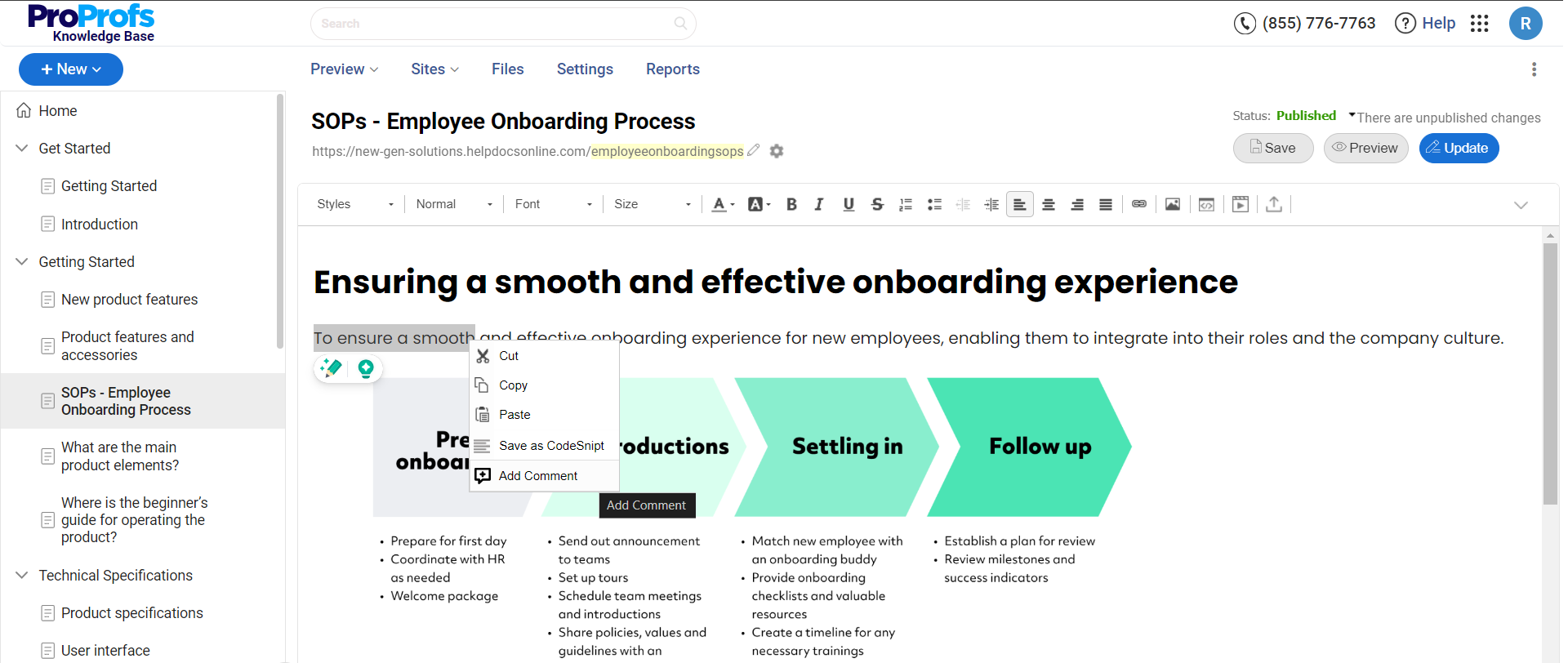As a business owner, there might be hundreds of things in your mind.
How to deliver the best-in-class support to customers and improve retention?
How to make employees stick to your organization and become lifelong contributors to its growth?
How to win customers, grow sales, and become the top brand the market has seen in years?
So many questions – one answer – a knowledge base!
Yes, you heard that right!
The benefits of knowledge base are innumerable. This mobile-friendly self-help platform is adept at catering to the requests of your customers and employees so they are always happy and satisfied.
From elevating the customer support experience to boosting productivity and collaboration in the workplace, a knowledge base can do all this and much more. Dive into this blog to discover the remarkable benefits you can reap by building a knowledge base.
What Makes a Good Knowledge Base
Before coming to the benefits of knowledge base, you should know what a good knowledge base looks like.
What features or elements can make your knowledge base an ultimate success?
In this section, we are going to talk about all this and much more.
1. Easy to Navigate
A knowledge base is a vast information resource comprising detailed articles on a variety of topics. Being a comprehensive platform, navigation is often a challenge for end users.
An ideal knowledge base is a breeze to navigate. It is a meticulously structured platform encompassing a home page and table of contents. With articles placed across topic-relevant categories, readers can effortlessly switch from one article to the other.
Another crucial factor that determines easy navigation is interlinking. A useful knowledge base has related articles interlinked to help readers reach the desired page in just a few clicks.
2. Simple to Follow
The purpose of knowledge base is to provide data to the end users in the simplest form.
Its articles are written in simple language that’s easy to follow and consume. With short paragraphs, bullet points, and numbered lists, making sense of the information provided is super easy.
Technical terms and concepts are explained clearly in the glossary section, making the overall problem-solving experience much easier for end users. Moreover, the article headings are action-oriented, with visuals supporting the written content.
3. Highly Searchable
The best knowledge bases out there have one thing in common. They all offer a blazing-fast search experience where end-users type a question or query and get instant, accurate results in seconds.
The articles in such knowledge bases are neatly arranged across categories and are enriched with keywords. With the right keywords used at the right places, it’s easy for the knowledge base search system to crawl articles and show relevant results to end users.
4. Serves a Global Audience
Another element of a successful knowledge base is its multilingual capabilities, especially when you have a global e-commerce business and need an e-commerce knowledge base.
Such a knowledge base works seamlessly with tools like Google Translate that allows end users to translate the content into their preferred language.
This promises a stellar support experience to a global audience, regardless of their geographical location and language preferences.
5. Mobile-Friendly
As of 2022, there were 4.97 bn active mobile internet users across the globe, and this number is only going to increase in the coming years.
A good knowledge base is one that caters to this audience that prefers to be always on the move. It works seamlessly on mobile phones, ensuring that end users can access all articles and search for information anytime and from anywhere they are.
Images and videos are automatically resized to fit the mobile screen size, giving readers an impeccable experience.
Read More: What Is Knowledge Base Construction Benefits & Best Practices
Top 10 Benefits of a Knowledge Base You Just Can’t Ignore
Now that you know all the elements that make up a good knowledge base, let’s explore the benefits it can bring to your customers as well as employees.
Broadly speaking, a knowledge base comes in 2 types – internal and external. While an internal knowledge base is for employees, an external knowledge base caters to customers.
Both these types of knowledge bases bring different benefits to the table, which we are going to cover in this section.
Benefits of Internal Knowledge Base
An internal knowledge base is a central hub of all the critical company information, such as workplace policies, standard operating procedures, code of conduct, client details, and much more. As a company-wide resource, an internal knowledge base can prove incredibly beneficial for your organization. Let’s learn how.
1. Increases Employee Productivity
According to research done by McKinsey & Company, employees spend around 19% of their work week looking for company information. This is a big productivity killer.
An internal knowledge base acts as a centralized information hub that equips employees with everything they need right at their fingertips.
It encompasses all your company policies, product and service information, standard operating procedures, and client data – basically all company knowledge that enhance employees work efficiency.
Having access to all the necessary information under one roof helps employees save a lot of time and stay laser-focused on the tasks that really matter. They no longer have to scroll through old emails, chats, and scattered documents to find what they need.
2. Improves Organizational Efficiency
Digging through scattered files to locate a single piece of information consumes a lot of time and also affects the efficiency with which processes and tasks are performed.
With an internal knowledge base, this problem can be solved in seconds.
Employees gain quick access to all process-related information, which aids the faster implementation of tasks. There is less confusion about what needs to be done and how, as every process is standardized and explained clearly in the knowledge base.
As employees are better positioned to perform their jobs with accuracy, the chances of errors reduce to a minimum, thus improving overall organizational efficiency.
3. Preserve Company Knowledge
No matter how long employees have been a part of your team, there will come a time when they will find a better opportunity and eventually move on for self-growth. This can risk your organization from losing all the knowledge and experiences employees acquired during their work tenure.
This affects the people who are left behind as the onus of completing all tasks falls on them.
An internal knowledge base can solve this issue. It provides your employees with a one-stop platform to regularly document their insights about the projects they are working on or the clients they are handling.
This way, it becomes easy for other team members to pick up the right pieces rather than beginning everything from scratch.
Read More: Knowledge Transfer – What it is & How to Achieve it?
4. Easy and Faster Onboarding
New employees have high hopes when they join a company. They are nervous and equally excited about the new challenges and growth opportunities their new roles will bring.
The first couple of weeks of new hires are crucial as they can literally can make or break the deal for them. There is a lot for new hires to learn and grasp during this time, and it can become a little overwhelming if things do not go in an orderly way.
An internal knowledge base can act like a buddy to new hires, helping them at every step right from the time they step into their new roles. It provides them with all the necessary training, data, project details, contact details, and other necessary information they need to perform well and succeed in their jobs.
This reduces the need for extensive training, thus saving you a tremendous amount of money and time.
Read More: Employee Onboarding: How to Use Your Knowledge Base Effectively
5. Better Collaboration and Internal Communication
A knowledge base is a great platform where your team members can collaborate and communicate.
This document keeps everyone on the same page with regard to the latest developments happening in your business.
It provides teams with a place where they can share ideas, discuss projects, and work together to achieve your business goals. With well-defined roles and permissions, employees are well aware of their responsibilities and take complete charge of the tasks they are assigned.
As a result, miscommunication stays miles away, and the decision-making capabilities of your employees improve manifold. Moreover, this also maximizes the productivity of your teams by removing the unnecessary to and fro.
Watch this quick video to learn more about boosting collaboration using your knowledge base.
Benefits of External Knowledge Base
External knowledge base benefits your customers who are looking for answers and do not wish to be kept on hold for hours. It is like a centralized library where customers can find all the information they need to resolve their queries and gain complete clarity on your products and services.
Let’s look at the key benefits that an external knowledge base can shower upon your business.
1. Reduces Support Tickets
One thing support teams struggle with is the piled-up work on their desk. This can be resolved with the help of a knowledge base.
According to a study published by Harvard Business Review, 81% of customers try to resolve their issues independently before reaching out to a company’s support team.
An external knowledge base empowers customers to find answers to all their questions in just a few clicks. This means customers can rely on a knowledge base for minor issues and raise tickets only for complex problems that a knowledge base cannot solve.
This brings down the tickets reaching your help desk. As a result, your support team is relieved from answering repetitive questions, and they will be able to focus on pressing issues that require their immediate attention.
Read More: How to Reduce Support Tickets With Self-Service Knowledge Base
2. Provide Uniform Responses to Customers
One of the advantages of a knowledge base is that it helps your support team in providing correct, uniform responses to customers.
Customers do not always get solutions to their queries over a single phone call. There are times when they have to reach out multiple times to your support team for help. Under such circumstances, it is very common for your customers to connect with different executives.
There is a possibility that different support executives give different solutions, which can confuse your customers even more.
Such situations can be avoided by deploying an external knowledge base.
With a centralized source of truth, all members of your support team have access to the same information, which helps maintain consistency in the responses customers receive.
3. Provide 24×7 Customer Support
Today’s customers seek convenience when interacting with a brand. They need easy and instant access to help at any time of the day, without relying on traditional mediums like calls and emails.
Even though you hire a team to work around the clock, it might not be possible to answer all customer queries immediately.
That’s where a knowledge base can help.
It lets customers solve issues on their own at any time of the day, and from anywhere they are. There are no restrictions on time and place and least dependence on your support staff.
Since a knowledge base can also be easily accessed on mobile phones, you can provide real-time, on-the-go support to customers and build lasting relationships.
4. Improves SEO
An SEO-ready knowledge base can improve your online visibility, helping you generate more traffic and rankings.
When your knowledge base contains high-quality articles enriched with the right keywords, it gets easier for Google to crawl the content and present it in the top results in SERP.
What happens when your knowledge base ranks well?
It improves content discoverability by customers as they don’t have to go from pillar to post to find your knowledge base. When they search for a related question on Google, your knowledge base comes up in the first few results, thus boosting the overall support experience.
In addition to this, a search engine optimized knowledge base also attracts new customers who come looking for a problem and bump into your knowledge base on Google. It also gives the impression that your brand is an authority on the subject and the insights provided in your knowledge base are credible.
5. Gain Useful Customer Self-Service Insights
Online knowledge bases can also provide rich insights into what your customers are looking for but not finding the answers to.
Wondering how?
Most knowledge base software these days encompass built-in reports that give a brief analysis of how your articles are performing.
With metrics like failed searches, poor-performing articles, and broken links, you can unlock key insights into which parts of your knowledge base are doing well and which ones need improvement. This information also gives a hint about the areas where customers are not happy with your self-help content.
Once you know what is working for you and what isn’t, you can make the necessary adjustments to your existing articles and make sure that you stay at the top of google searches for weeks, months, and years.
Watch this quick video to understand how you can analyze your knowledge base.
All Set to Build Your Knowledge Base?
The ultimate goal of creating a knowledge base is that it saves everybody’s time and effort. By putting all the necessary information under one roof, you can ensure that your customers and employees are satisfied and can have what they need without any headaches.
A knowledge base that is well-structured, up-to-date, and includes relevant articles can be a good source of information for end users. While on the one hand, it helps improve collaboration, knowledge sharing, and employee productivity, on the other hand, it helps you reduce tickets and provide 24×7 customer support.
If you also desire to achieve such benefits and take your organization to greater heights, you can create a knowledge base with ProProfs.
ProProfs Knowledge Base is an easy-to-use tool that can help you at every stage of content creation right from writing and editing to customization and final publication. Whether you aim to build an external or internal knowledge base, this tool can fit all your needs.
 Tips
Tips
We’d love to hear your tips & suggestions on this article!
FREE. All Features. FOREVER!
Try our Forever FREE account with all premium features!

 We'd love your feedback!
We'd love your feedback! Thanks for your feedback!
Thanks for your feedback!







